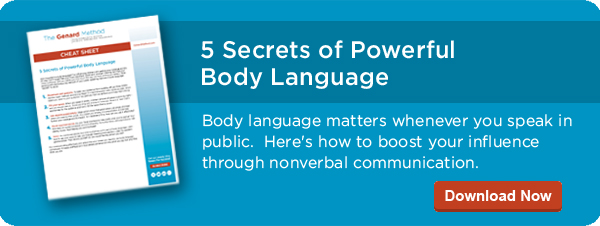Anybody can be a reasonably good public speaker—and many people are. But if you want more, to reach the next level and become a truly memorable speaker or presenter, you need to follow some specific rules.
The following 10 items or "apps" constitute an Effective Public Speaking Toolkit. Pay attention to them, individually and as a group, and you'll give audiences something they don't get every day. Ignore them and you'll remain earth-bound in your presentations; or worse, your message and you yourself may sink without a trace.
That may sound harsh. But think about the talks, lectures, and speeches you've heard in the past year. How many of them do you recall fondly now, and how many of them have changed you significantly in some way?
Use these 10 tools, then, to become the public speaking rock star you've always wanted to be. You've got nothing to lose except the timid would-be star inside you!
1. Stance and Physical Presence. Pay attention to the one, and have the other. Avoid a weak stance, crossed legs, slumping posture, and arm arrangements that close you off from your listeners. And if you speak behind a lectern, beware the "Velcro Effect," where you anchor yourself to the structure and prevent yourself from using your body, one of your key communication tools.
2. Launching Your Speech. That means keeping 100% focus as you greet your audience, not shifting your gaze between them and your notes. Bring your energy level up, since a speech is a performance. The clues you give your audience as you begin tell them you're going to be interesting or not. Get a strong lift-off so your mission has a chance to succeed!
3. Using a Grabber, and Memorizing Your Opening. Stay away from the "Today I'm going to talk about" style of opening, which is pedestrian and boring. Grab your audience's engagement with an opening that piques their interest. Surprise them. You really need to nail your audience's attention to make them willing to listen, so memorize exactly how you'll do so. Here are 12 foolproof ways to open a speech.
4. Supporting Your Words with Your Voice. In English, the most important word or phrase most often comes at the end of a sentence. So don't trail away just when your audience needs the "punch line!" Practice out loud until you develop the habit of staying strong vocally all the way through the full expression of your ideas.
5. Developing Vocal Expressiveness. Your voice is a limitless tool when it comes to expressing all the subtleties that speech (and the human mind) are capable of. Learn to use The 5 Key Tools of Vocal Dynamics: energy and emphasis, pitch inflection, pauses and silence, rhythm and pace, and vocal quality. The one you probably most need to strengthen is pitch inflection.
6. Telling Your Story. Stop thinking in terms of delivering information and start telling your story. Think of this app as giving your narrative if you prefer that label. But find ways to draw your listeners in and share the human aspects of your message. If you start thinking of your speech that way, it's easy to bring in information but not make doing so the entire game.
7. Making Your Transitions and Main Points Clear. Audiences need information and other aspects of your speech in bite-size pieces. And they need to hear when one component of your talk ends and the next one begins. That's why transitions are important. You know your main points and how they're connected, but your listeners don't. Help them out.
8. Living in the World of Your Audience. As speakers, we are all consistently and enduringly egotistical. It's natural to present our ideas in terms of our own experience. But it's far more effective to present ideas in terms of your audience's experience. Look for ways to think and speak with your audience's needs in mind, not your own.
9. Concluding Strongly. Just as you need a Grabber to launch your talk, you need a Clincher to bring it all home. The whole idea of speaking is for your message to resonate in the minds of listeners when you're finished speaking. So use a rhetorical device that will allow that to happen. Here are a dozen ways to end a speech vividly and memorably.
10. Nailing Q & A. Whether you love the opportunity to have a true dialogue with your audience, or dread the idea that you don't know what's coming from questioners, Q & A is an excellent way to seal the deal with listeners. It's really far easier to prepare and practice a speech than to handle yourself with style, knowledge, and wit in Q & A. The more you can do so, the better the chance your audience will consider you a true public speaking rock star.



